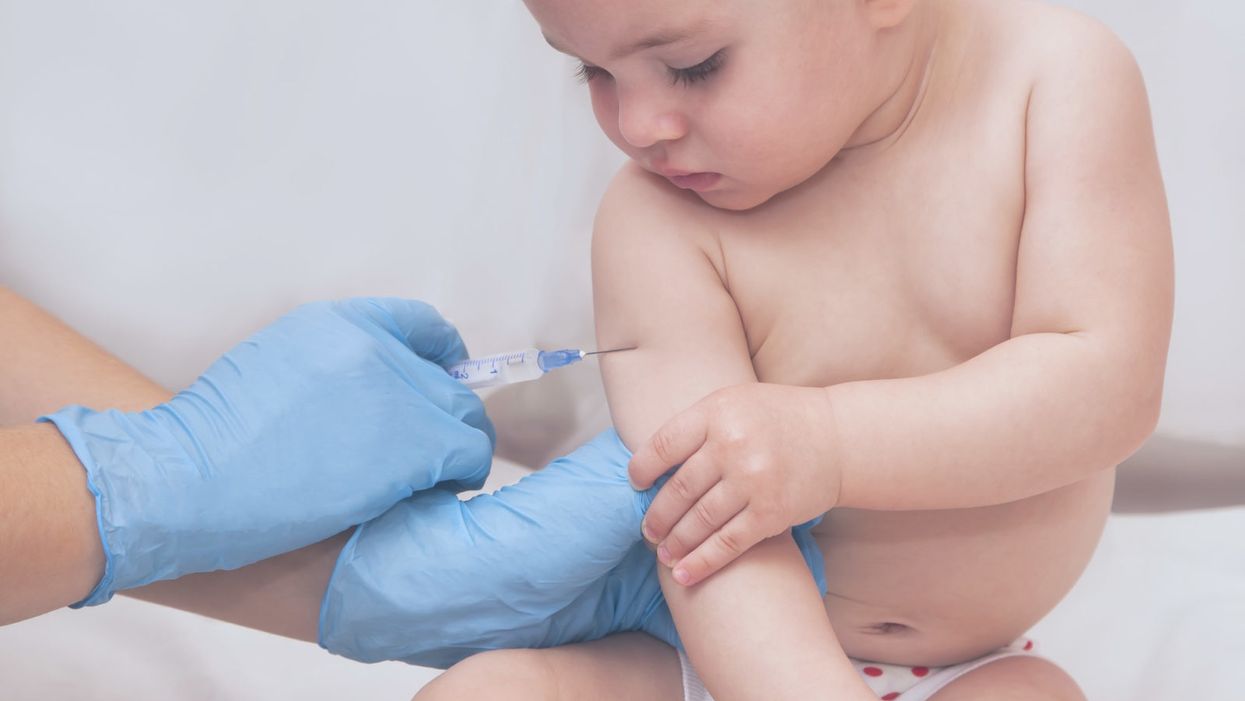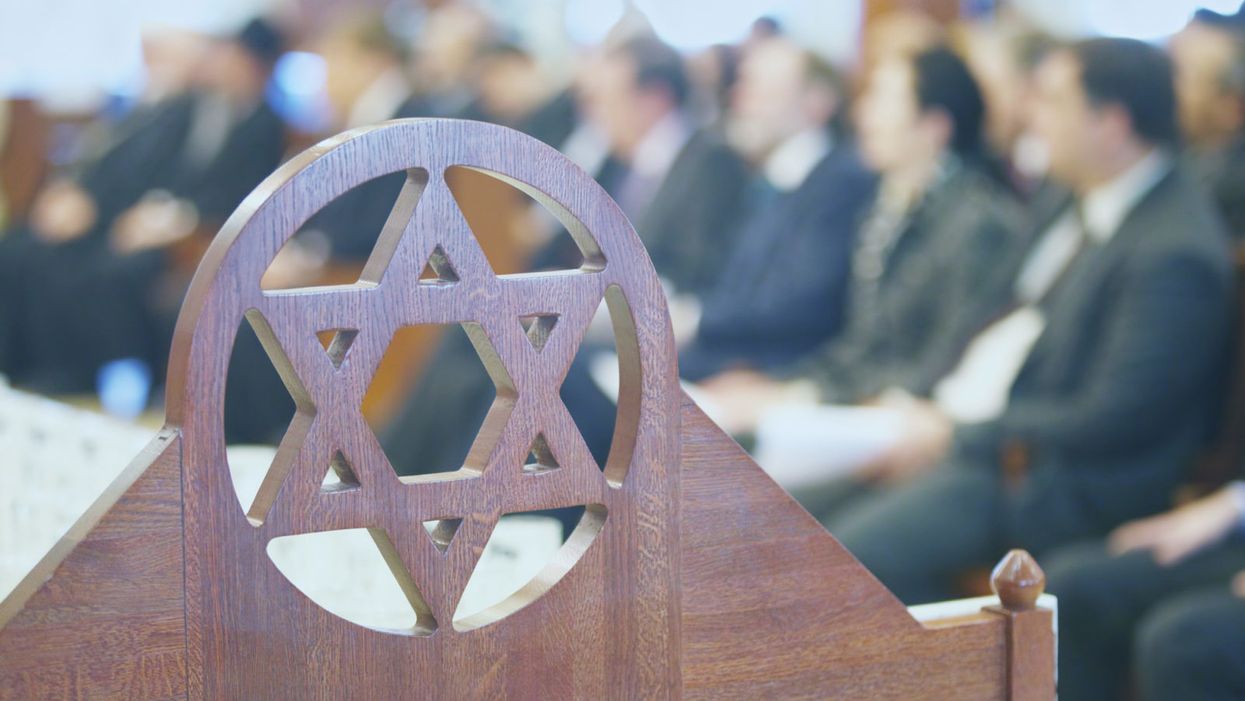A pediatrician gives a one-year-old child a vaccine.
[Editor's Note: This opinion essay is in response to our current Big Question, which we posed to experts with different viewpoints: "Where should society draw the line between requiring vaccinations for children and allowing parental freedom of choice?"]
Society has a right and at times an obligation to require children to be vaccinated. Vaccines are one of the most effective medical and public health interventions. They save lives and prevent suffering. The vast majority of parents in the United States fully vaccinate their children according to the recommended immunization schedule. These parents are making decisions so that the interests of their children and the interest of society are the same. There are no ethical tensions.
"Measles is only a plane ride away from American children."
A strong scientific basis supports the recommended immunization schedule. The benefits of recommended vaccines are much bigger than the risks. However, a very small proportion of parents are ideologically opposed to vaccines. A slightly larger minority of parents do not believe that all of the recommended vaccines are in their child's best interests.
Forgoing vaccinations creates risk to the child of contracting diseases. It also creates risk to communities and vulnerable groups of people who cannot be vaccinated because of their age or health status.
For example, many vaccines are not able to be given to newborns, such as the measles vaccine which is recommended at 12-15 months of age, leaving young children vulnerable. Many diseases are particularly dangerous for young children. There are also some children who can't be vaccinated, such as pediatric cancer patients who are undergoing chemotherapy or radiation treatment. These children are at increased risk of serous complication or death.
Then there are people who are vaccinated but remain susceptible to disease because no vaccine is 100% effective. In the case of measles, two doses of vaccines protect 97% of people, leaving 3% still susceptible even after being fully vaccinated. All of these groups of people – too young, not eligible, and vaccinated but still susceptible – are dependent on almost everyone else to get vaccinated in order for them to be protected.
Sadly, even though measles has been largely controlled because most people get the very safe and very effective vaccine, we are now seeing dangerous new outbreaks because some parents are refusing vaccines for their children, especially in Europe. Children have died. Measles is only a plane ride away from American children.
There have been repeated measles outbreaks in the United States – such as the Disneyland outbreak and six outbreaks already this year - because of communities where too many parents refuse the vaccine and measles is brought over, often from Europe.
The public health benefits cannot be emphasized enough: Vaccines are not just about protecting your child. Vaccines protect other children and the entire community. Vaccine-preventable diseases (with the exception of tetanus) are spread from person to person. The decision of a parent to not vaccinate their child can endanger other children and vulnerable people.
As a vaccine safety researcher for 20 years, I believe that the community benefit of vaccination can provide justification to limit parental autonomy.
Given these tensions between parental autonomy and the protective value of vaccines, the fundamental question remains: Should society require all children to submit to vaccinations? As a vaccine safety researcher for 20 years, I believe that the community benefit of vaccination can provide justification to limit parental autonomy.
In the United States, we see this balancing act though state requirements for vaccinations to enter school and the varying availability of non-medical exemptions to these laws. Mandatory vaccination in the United States are all state laws. All states require children entering school to receive vaccines and permit medical exemptions. There are a lot of differences between states regarding which vaccines are required, target populations (daycare, school entry, middle school, college), and existence and types of non-medical (religious or philosophical) exemptions that are permitted.
Amid recent measles outbreaks, for instance, California eliminated all non-medical exemptions, making it one of three states that only permit medical exemptions. The existence and enforcement of these school laws reflect broad public support for vaccines to protect the community from disease outbreaks.
I worry about how many kids must suffer, and even die, from diseases like measles until enough is enough. Such tragedies have no place in the modern era. All parents want to do right by their children. All parents deserve autonomy when it comes to decision-making. But when their choices confer serious risks to others, the buck should stop. Our nation would be better off—both medically and ethically—if we did not turn our backs on our most vulnerable individuals.
[Editor's Note: Read the opposite viewpoint here.]
Scientists and Religious Leaders Need to Be More Transparent
A steeple cross at sunset.
[Editor's Note: This essay is in response to our current Big Question series: "How can the religious and scientific communities work together to foster a culture that is equipped to face humanity's biggest challenges?"]
As a Jesuit Catholic priest, and a molecular geneticist, this question has been a fundamental part of my adult life. But first, let me address an issue that our American culture continues to struggle with: how do science and religion actually relate to each other? Is science about the "real" world, and religion just about individual or group beliefs about how the world should be?
Or are science and religion in direct competition with both trying to construct explanations of reality that are "better" or more real than the other's approach? These questions have generated much discussion among scientists, philosophers, and theologians.
The recent advances in our understanding of genetics show how combining the insights of science and religion can be beneficial.
First, we need to be clear that science and religion are two different ways human beings use to understand reality. Science focuses on observable, quantifiable, physical aspects of our universe, whereas, religion, while taking physical reality into consideration, also includes the immaterial, non-quantifiable, human experiences and concepts which relate to the meaning and purpose of existence. While scientific discoveries also often stimulate such profound reflections, these reflections are not technically a part of scientific methodology.
Second, though different in both method and focus, neither way of understanding reality produces a more "real" or accurate comprehension of our human existence. In fact, most often both science and religion add valuable insights into any particular situation, providing a more complete understanding of it as well as how it might be improved.
The recent advances in our understanding of genetics show how combining the insights of science and religion can be beneficial. For instance, the study of genetic differences among people around the world has shown us that the idea that we could accurately classify people as belonging to different races—e.g. African, Caucasian, Asian, etc.—is actually quite incorrect on a biological level. In fact, in many ways two people who appear to be of different races, perhaps African and Caucasian, could be more similar genetically than two people who appear to be of the same African race.
This scientific finding, then, challenges us to critically review the social categories some use to classify people as different from us, and, therefore, somehow of less worth to society. From this perspective, one could argue that this scientific insight synergizes well with some common fundamental religious beliefs regarding the fundamental equality all people have in their relationship to the Divine.
However, this synergy between science and religion is not what we encounter most often in the mass media or public policy debates. In part, this is due to the fact that science and religion working well together is not normally considered newsworthy. What does get attention is when science appears to conflict with religion, or, perhaps more accurately, when the scientific community conflicts with religious communities regarding how a particular scientific advance should be applied. These disagreements usually are not due to a conflict between scientific findings and religious beliefs, but rather between differing moral, social or political agendas.
One way that the two sides can work together is to prioritize honesty and accuracy in public debates instead of crafting informational campaigns to promote political advantage.
For example, genetically modified foods have been a source of controversy for the past several decades. While the various techniques used to create targeted genetic changes in plants—e.g. drought or pest resistance—are scientifically intricate and complex, explaining these techniques to the public is similar to explaining complex medical treatments to patients. Hence, the science alone is not the issue.
The controversy arises from the differing goals various stakeholders have for this technology. Obviously, companies employing this technology want it to be used around the world both for its significantly improved food production, and for improved revenue. Opponents, which have included religious communities, focus more on the social and cultural disruption this technology can create. Since a public debate between a complex technology on one side, and a complex social situation on the other side, is difficult to undertake well, the controversy has too often been reduced to sound bites such as "Frankenfoods." While such phrases may be an effective way to influence public opinion, ultimately, they work against sensible decision-making.
One way that the two sides can work together is to prioritize honesty and accuracy in public debates instead of crafting informational campaigns to promote political advantage. I recognize that presenting a thorough and honest explanation of an organization's position does not fit easily into our 24-hour-a-day-sound-bite system, but this is necessary to make the best decisions we can if we want to foster a healthier and happier world.
Climate change and human genome editing are good examples of this problem. These are both complex issues with impacts that extend well beyond just science and religious beliefs—including economics, societal disruption, and an exacerbation of social inequalities. To achieve solutions that result in significant benefits for the vast majority of people, we must work to create a knowledgeable public that is encouraged to consider the good of both one's own community as well as that of all others. This goal is actually one that both scientific and religious organizations claim to value and pursue.
The experts often fail to understand sufficiently what the public hopes, wants, and fears.
Unfortunately, both types of organizations often fall short because they focus only on informing and instructing instead of truly engaging the public in deliberation. Often both scientists and religious leaders believe that the public is not capable of sufficiently understanding the complexities of the issues, so they resort to assuming that the public should just do what the experts tell them.
However, there is significant research that demonstrates the ability of the general public to grasp complex issues in order to make sound decisions. Hence, it is the experts who often fail to understand how their messages are being received and what the public hopes, wants, and fears.
Overall, I remain sanguine about the likelihood of both religious and scientific organizations learning how to work better with each other, and together with the public. Working together for the good of all, we can integrate the insights and the desires of all stakeholders in order to face our challenges with well-informed reason and compassion for all, particularly those most in need.
[Ed. Note: Don't miss the other perspectives in this Big Question series, from a science scholar and a Rabbi/M.D.]
Scientists: Don’t Leave Religious Communities Out in the Cold
A star of David reflects the perspective of a Rabbi/M.D. on an important question about the future of society.
[Editor's Note: This essay is in response to our current Big Question series: "How can the religious and scientific communities work together to foster a culture that is equipped to face humanity's biggest challenges?"]
I humbly submit that the question should be rephrased: How can the religious and scientific communities NOT work together to face humanity's biggest challenges? The stakes are higher than ever before, and we simply cannot afford to go it alone.
I believe in evolution -- the evolution of the relationship of science and religion.
The future of the world depends on our collaboration. I believe in evolution -- the evolution of the relationship of science and religion. Science and religion have lived in alternately varying relationships ranging from peaceful coexistence to outright warfare. Today we have evolved and have begun to embrace the biological relationship of mutualism. This is in part due to the advances in medicine and science.
Previous scientific discoveries and paradigm shifts precipitated varying theological responses. With Copernicus, we grappled with the relationship of the earth to the universe. With Darwin, we re-evaluated the relationship of man to the other creatures on earth. However, as theologically complex as these debates were, they had no practical relevance to the common man. Indeed, it was possible for people to live their entire lives happily without pondering these issues.
In the 21st century, the microscope is honing in further, with discoveries relating to the understanding of the very nature and composition of the human being, both body and mind/soul. Thus, as opposed to the past, the implications of the latest scientific advances directly affect the common man. The religious implications are not left to the ivory tower theologians. Regular people are now confronted with practical religious questions previously unimagined.
For example, in the field of infertility, if a married woman undergoes donor insemination, is she considered an adulteress? If a woman of one faith gestates the child of another faith, to whose faith does the child belong? If your heart is failing, can you avail yourself of stem cells derived from human embryos, or would you be considered an accomplice to murder? Would it be preferable to use artificially derived stem cells if they are available?
The implications of our current debates are profound, and profoundly personal. Science is the great equalizer. Every living being can potentially benefit from medical advances. We are all consumers of the scientific advances, irrespective of race or religion. As such, we all deserve a say in their development.
If the development of the science is collaborative, surely the contemplation of its ethical/religious applications should likewise be.
With gene editing, uterus transplants, head transplants, artificial reproductive seed, and animal-human genetic combinations as daily headlines, we have myriad ethical dilemmas to ponder. What limits should we set for the uses of different technologies? How should they be financed? We must even confront the very definition of what it means to be human. A human could receive multiple artificial transplants, 3D printed organs, genetic derivatives, or organs grown in animals. When does a person become another person or lose his identity? Will a being produced entirely from synthetic DNA be human?
In the Middle Ages, it was possible for one person to master all of the known science, and even sometimes religion as well, such as the great Maimonides. In the pre-modern era, discoveries were almost always attributed to one individual: Jenner, Lister, Koch, Pasteur, and so on. Today, it is impossible for any one human being to master medicine, let alone ethics, religion, etc. Advances are made not usually by one person but by collaboration, often involving hundreds, if not thousands of people across the globe. We cite journal articles, not individuals. Furthermore, the magnitude and speed of development is staggering. Add artificial intelligence and it will continue to expand exponentially.
If the development of the science is collaborative, surely the contemplation of its ethical/religious applications should likewise be. The issues are so profound that we need all genes on deck. The religious community should have a prominent seat at the table. There is great wisdom in the religious traditions that can inform contemporary discussions. In addition, the religious communities are significant consumers of, not to mention contributors to, the medical technology.
An ongoing dialogue between the scientific and religious communities should be an institutionalized endeavor, not a sporadic event, reactive to a particular discovery. The National Institutes of Health or other national organizations could provide an online newsletter designed for the clergy with a summary of the latest developments and their potential applications. An annual meeting of scientists and religious leaders could provide a forum for the scientists to appreciate the religious ramifications of their research (which may be none as well) and for the clergy to appreciate the rapidly developing fields of science and the implications for their congregants. Theological seminaries must include basic scientific literacy as part of their curricula.
We need the proper medium of mutual respect and admiration, despite healthy disagreement.
How do we create a "culture"? Microbiological cultures take time and require the proper medium for maximal growth. If one of the variables is altered, the culture can be affected. To foster a culture of continued successful collaboration between scientists and religious communities, we likewise need the proper medium of mutual respect and admiration, despite healthy disagreement.
The only way we can navigate these unchartered waters is through constant, deep and meaningful collaboration every single step of the way. By cultivating a mutualistic relationship we can inform, caution and safeguard each other to maximize the benefits of emerging technologies.
[Ed. Note: Don't miss the other perspectives in this Big Question series, from a science scholar and a Reverend/molecular geneticist.]


